“I am a Hindu, a Muslim, a Christian, a Parsi, a Jew,” Mahatma Gandhi once said, underlining his hope for a nation defined by pluralism, tolerance and equality.
India’s seven-decade post-independence journey is anything but complete, as the nation still deals with corruption, poverty and intolerance. But Gandhi’s founding vision is not shared by Prime Minister Narendra Modi nor his Bharatiya Janata Party (BJP). In its support of the controversial Citizenship Amendment Act and other immigration reforms, Modi’s government has pushed the country in the wrong direction by sowing division and impeding social development.
By adding just a few lines to the rules that regulate Indian citizenship, the BJP has made it easier for non-Indians of certain religions — Hindus, Sikhs, Buddhists, Jains, Parsis, and Christians — to become naturalized. Notably, the act left out Muslims — excluding them from naturalization by omission. In a parliament where the BJP maintains a stifling majority, the blatant discrimination written into the act did not prevent its passage. These deliberately exclusionary moves — undertaken by a nationalist ruling party that portrays itself as the voice of Hindus above all else — are difficult to reconcile with the ethos of a democracy that has been secular since its founding in 1947.
Even more alarmingly, Modi’s government wants to demand proof of citizenship from all 1.3 billion people who reside within India’s borders, a move that some worry will disproportionately affect the poor and Muslims — even those whose families have been in the country for generations.
The effects of requiring proof of citizenship could be disastrous for Hindus and Muslims alike, especially since India’s population is about 70 percent rural and widely lacks internet access. It is challenging for millions of people to gain access to the governmental processes necessary to obtain the required documentation. For instance, 40 percent of Muslim children lacked birth certificates as of 2016;; Modi’s demand could leave millions of them stateless.
This, sadly, is what Modi intends. Questioning the citizenship of the most vulnerable members of Indian society — in conjunction with the Citizenship Amendment Act, which makes it tougher for Muslims than for Hindus to gain citizenship — is a convenient way for the nationalist government to disenfranchise and alienate a minority whose welfare they value little. It is undemocratic, discriminatory and, worst of all, an attack on the secularism that has maintained peace between religions for a generation. Republican ideals about equality in the eyes of the state, regardless of one’s faith, are under attack.
Even from a pragmatic point of view, Modi’s national citizenship registry is downright impractical to implement. Over the past few years, the government applied a small-scale version of the project in the state of Assam, responsible for about 3 percent of the country’s population. Even there, citizens footed a massive bill: $200 million, run up by salaries for 52,000 employees and by years of outreach to remote areas. Rolling out the project for 1.3 billion people would be impossibly expensive. The project serves merely a political goal for the BJP, with little benefit to the average Indian.
Worse still, violence is already beginning to erupt, a sign that independence-era wounds of religious conflict in India have never fully healed. Just after the government’s proposals became law in December, protests resulted in the death of 27 people — mostly Muslims. Since then, thousands of arrests have contributed to chaos nationwide, as Muslims and left-leaning Hindus voice their opposition to the government’s actions. The sectarian goals of the BJP are not worth the innocent lives that have been lost.
The government is also emboldening the actions of racist groups, such as those behind what is known as the Hindutva movement – a Hindu nationalist coalition that rejects the place of all other religions in India. Now that moderates have been expelled from positions of power, religious fundamentalists have become more belligerent. Early in January of this year, student protesters at the left-wing Jawaharlal Nehru University were assaulted by assailants who consider any objection to the new laws to be anti-Hindu. Sickeningly, nurses and doctors who tried to help injured students were attacked as well. In Modi’s India, there is no room for dissent. You are Hindu, or you are not Indian at all.
Indians and the global community need to see through the BJP’s charades and condemn the erosion of republican ideals in the world’s largest democracy. As India’s economy slows, with corruption still endemic, Modi needs a distraction that will protect his party politically. But in the process, he is redefining a basic question: What does it mean to be Indian?
Arjun Shanmugam ’23 can be reached at arjun_shanmugam@brown.edu. Please send responses to this opinion to letters@browndailyherald.com and op-eds to opinions@browndailyherald.com.





